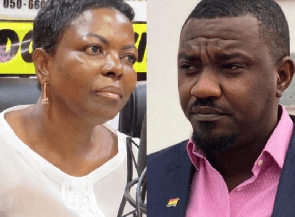A little over a year ago, a fiercely contested by-election at the Ayawaso West Wuogon (AWW) constituency saw Hon. Lydia Seyram Alhassan become the Member of Parliament for the area, winning with 68.8% of the vote. One year and a few months on, another fierce contest is raging in the constituency. This time without hooded men and vigilantes, but rather performative enactment of deep pockets and concern for the grassroots demonstrated by gift giving, provision of consumables and various acts of charity by the two parliamentary candidates, courtesy COVID-19.
I argue that if their efforts are aimed at votes in December, then it is a waste of resources. However, if it is to actually help, then it can be done in a substantially improved manner.
Donations to groups within constituencies are neither new nor surprising. Nonetheless, in this particular situation, the people involved, the scale of donations and the peculiar characteristics of constituency in question, combine to make this an issue of interest.
Firstly, the protagonists are Hon. Lydia Alhassan, the incumbent seeking reelection and famous actor and entrepreneur John Dumelo: a woman and a young person (age 36) respectively. Hence, both candidates are representative of minority demographics in Ghana’s legislative arm of government. Young MPs i.e. those under 40 (almost 15%) and women (nearly 13%) are underrepresented in Ghana’s parliament. Due to this, the two leading parties have implemented rules aimed at increasing the number of young people and women who participate in parliamentary elections.
The NPP offered a 50% rebate for youth and women aspirants, while the National Democratic Congress (NDC) asked women aspirants to pay only half of the required nomination fees. It is therefore surprising to me that members of such hitherto perceived vulnerable minority groups, for whom rules were made to ease their financial burdens, are engaged in a resource-intensive campaign of donating huge quantities of various food items and hand sanitizers to residents of AWW. As soon as the first 2 cases in Ghana were reported, the two candidates hit the ground.
John Dumelo started with sanitisers, veronica buckets and soap to students and police stations. Madam Lydia responded with a counterpunch of similar items to taxi drivers and market women. The charitable fisticuffs have been ongoing since. As of 3rd April, John Dumelo by his own reckoning had donated over 7,000 hand sanitisers, bags of rice, oil, eggs (from his farm), 2570 loaves of bread, gari and bags of water to the “less privileged” in the constituency. His latest addition has been to ask his followers to download a money remittance app, and is donating “small sums” (I have personally seen $13) of money to several people via said app. Hon. Lydia Seyram Alhassan also operates food vans which randomly donate foods to households. On 17th April alone, she donated 3,000 bags of rice, 500 crates of eggs and 2,000 gallons of hand sanitisers to churches in AWW for onward distribution to at-risk members.
The rationale being that since churches have considerable experience in providing social services and are also a regular point of call for needy individuals, they will be in a good position to identify those who truly need aid and prevents the allegations of food being shared based on party affiliations. The monetary value of these donations are no doubt huge, and leaves one to wonder the source of funds, how long they can sustain this and whether it has any effect on their electoral outcomes. How are members of two of the most marginalized groups in our political history (youth and women) able to marshal and deploy resources of such magnitude?
Secondly, Ayawaso West Wuogon comprises some of the most well-to-do areas in Ghana. This is a constituency that includes Accra’s most luxurious enclaves like East Legon, Dzorwulu, Airport West and Roman Ridge. It has a literacy rate of 89%, and 7 out of 10 people are able to read and write English or French. It is home to several tertiary institutions including the University of Ghana. Residents here disproportionately include the elite and middle class.
I am fully aware there are pockets of developing slums and residents in “shanty towns” but the constituency is a far cry from the kind of place you would expect food donations to receive so much paramouncy in these times. Despite the efforts of John Dumelo to present the constituency in that light through his tweets, the facts are that the AWW is a constituency for the rich. One of the few places in Ghana where the masses are not the masses. Even a cursory look at the population dynamics within the constituency will reveal this. So then, why is so much food relief going to a constituency which is best known for its elitism and affluence?
If the aspirants are doing this for the votes, then I strongly believe it is money down the drain, for a number of reasons. Firstly, a huge chunk of voters there are students including those from UG, GIMPA, UPSA who have left campus and due to the President’s directives and hence not benefitting directly from these giveaways. Secondly, many of those receiving these packages, in my opinion, are not in dire need of them due to the population profile of the constituency.
Consequently, by receiving these items, they are merely locking up resources that would be more appreciated elsewhere. Thirdly, political attitudes in Ghana lean strongly towards party lines, with the formation of “strongholds” over time. AWW for example has been an NPP seat since 2000, with the party winning with an average of 52.8%. In such areas, views are entrenched. It takes a lot more than sharing food items to sway voters.
Thus, NPP voters who receive food from Maa Lydia will be grateful, whereas the same people when receiving food from John Dumelo will perceive it as a good opportunity to “milk” him i.e. take his food and not vote for him as well. Thus, these supplies in themselves cannot provide the needed push to sway the needed votes. Finally, what happens when the same households receive items from the two candidates? Nothing! They will simply revert to their default party affiliations.
On the other hand, one would say these are humanitarian gestures to alleviate the difficulty of lockdown. If that is the case, then I think the aspirants can make some changes to their approach which will increase both the gains to beneficiaries and the payoff for themselves.
Firstly, both aspirants can agree to work together in distributing the relief items. That way, residents will truly feel they are beneficiaries of a genuine attempt to make life comfortable for them during the lockdown, and not pawns on a grand political chessboard. Secondly, such cooperation would have the benefit of coordination and efficiency. This will prevent the same households from receiving so much, when other households have not been catered for. Coordination between the two camps will prevent duplication of efforts and make the distribution equitable.
Finally, such a united front will help defuse any lingering tensions from the 2019 by-elections and set the stage for a peaceful election in 2020. A combination of their efforts will lead to the creation of political goodwill which none of the aspirants could receive on their own. In our country where bipartisan collaboration is so scarce, doing so at this time will culminate in a synergy of political capital which each of the candidates by themselves would not attain.
Our elders say that when two elephants fight, it is the grass that suffers. In this case, it is an elephant and an umbrella doing the fighting. But far from suffering, the grass here is undoubtedly enjoying. Is this a truly free lunch or residents of AWW would have to pay back in December?
Opinions of Saturday, 6 June 2020
Columnist: Joseph Mireku Nti
Changing lives or chasing votes: Ayawaso West Wuogon
Entertainment














